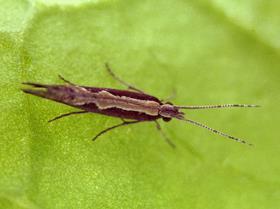
A “super moth” that attacks brassica crops has been found in “exceptionally high numbers” across the UK, Rothamsted Research has said.
In a special announcement, the institute said around 100 times more Diamondback moths, also known as Plutella Xylostella, have been identified in late May and early June.
Traps in eastern England and the Channel Islands reported around 10 times the normal annual counts over a period of a few nights, with high numbers also found in Lincolnshire, Warwickshire, Oxfordshire, Bedfordshire, North Yorkshire, County Durham and Berkshire.
Twitter user @migrantmothUK recently posted about a two-mile cloud of moths, near Leominster, while one observer said it was like 'driving through rain', local paper the Plymouth Herald has reported.
The moth usually migrates from Europe at this time of year, and has been found to be resistant to most insecticides, including pyrethroids and diamide, leading to it being described as a “super pest”.
It causes feeding and cosmetic damage that can lead to severe losses in cruciferous crops, such as brassica and cauliflower.
The Rothamsted Insect Survey, which has long-term annual records of the pest’s migration, reported that numbers reported so far this year are exceptionally high, with observations up until 10 June 2016. Similarly high numbers were last observed in 1996.
Chris Shortall, coordinator of the Rothamsted light-trap network, explained: “I noticed higher numbers than usual in the light-trap samples at Rothamsted and saw online that the moth-observing community was reporting high incidence of Diamondback moths.”
'Normally, we gather the data at the end of the year from the volunteers that run light-traps around the country, but on the basis of these reports I contacted them and asked them to provide the data that they have so far. They reported much higher numbers than usual. In our light-traps here at Rothamsted we have seen in two nights the number of diamondback moths that we usually record in a year, and this is reflected elsewhere in the network.”
Shortall said he is “concerned for cabbage and cauliflower growers”, and warned that if summer weather is warm and favourable for reproduction of the moths there could be an explosion in their number by the end of the season.
Steve Foster, senior scientist at Rothamsted Research, said: “We will aim to study the moths that are immigrating currently to the UK to identify whether they are resistant to the available insecticides and look for potential management methods. This could take up to a few weeks.
“Growers should seek advice from their agronomists and authorised advisers as to how to manage the pest in their farms. We will aim to provide all scientific information when the data are available.”



